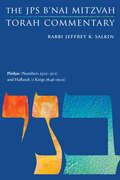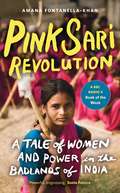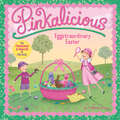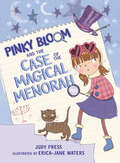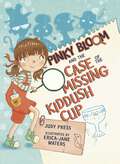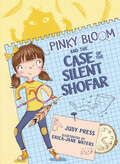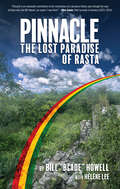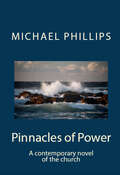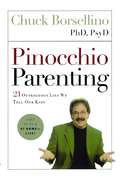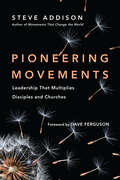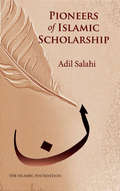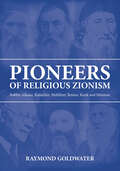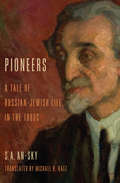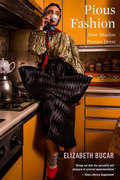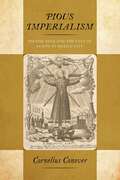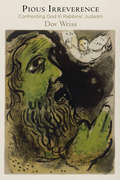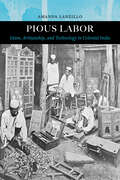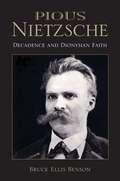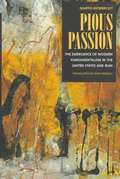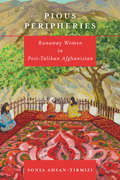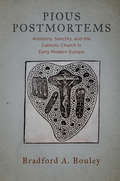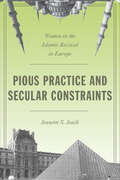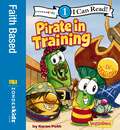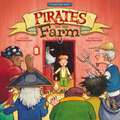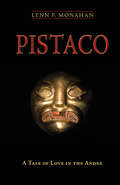- Table View
- List View
Pinhas: The JPS B'nai Mitzvah Torah Commentary (JPS Study Bible)
by Rabbi Jeffrey K. SalkinPinhas (Numbers 25:10-30:1) and Haftarah (1 Kings 18:46-19:21): The JPS B’nai Mitzvah Torah Commentary shows teens in their own language how Torah addresses the issues in their world. The conversational tone is inviting and dignified, concise and substantial, direct and informative. Each pamphlet includes a general introduction, two model divrei Torah on the weekly Torah portion, and one model davar Torah on the weekly Haftarah portion. Jewish learning—for young people and adults—will never be the same. The complete set of weekly portions is available in Rabbi Jeffrey K. Salkin’s book The JPS B’nai Mitzvah Torah Commentary (JPS, 2017).
Pink Sari Revolution: A Tale of Women and Power in the Badlands of India
by Amana Fontanella-KhanWhen Sheelu was arrested for stealing from a powerful politician in the notoriously crooked region of Uttar Pradesh, she was sure that she would be forced to accept a prison sentence, not least because she had alleged that she had been assaulted by a man in the politician's household. But then Sampat Pal heard word of the charges, and the formidable commander of the pink-sari-wearing, pink-baton-wielding, 20,000-strong 'Pink Gang' decided to shake things up. Narrating the story of Sampat Pal and the Pink Gang's fight for Sheelu, as well as for others facing injustice and oppression, journalist Amana Fontanella-Khan delivers a riveting portrait of women grabbing fate with their own hands - and winning back their lives.
Pinkalicious: Eggstraordinary Easter (Pinkalicious)
by Victoria KannThis storybook sends the Pinkerton family on an eggsciting Easter scavenger hunt!When Pinkalicious wakes up on Easter morning, she finds a note from Edgar Easter Bunny that leads to a fun family day. Your family will enjoy sharing this storybook —the perfect Easter and springtime read.#1 New York Times bestselling author Victoria Kann's treat of a story has become an Easter favorite for kids and parents. Readers can watch Pinkalicious and Peter on the funtastic PBS Kids TV series Pinkalicious & Peterrific!
Pinky Bloom and the Case of the Magical Menorah (Pinky Bloom)
by Judy PressPinky Bloom, Brooklyn's greatest kid detective, takes on a new case just in time for Hanukkah. When an extremely valuable ancient Israeli coin is stolen from her synagogue, Pinky sets out to find the thief. But other strange events keep distracting her. Could they be connected to the supposedly magical menorah that her neighbor has left in her family's care? Only Pinky can get to the bottom of this—with a little help from her annoying little brother.
Pinky Bloom and the Case of the Missing Kiddush Cup (Pinky Bloom)
by Judy PressFourth grader Penina—aka Pinky—is a Yankees fan, an older sister, and Brooklyn's greatest kid detective. With the help of her pet cat DJ, her best pal Lucy Chang, and her little brother Avi, Pinky unravels a vexing mystery—what happened to the ancient Jewish Kiddush cup that went missing from a museum exhibit? Pinky and her team get to the bottom of things through a series of exciting and intriguing adventures.
Pinky Bloom and the Case of the Silent Shofar (Pinky Bloom)
by Judy PressPinky Bloom is on the Case! Pinky Bloom is already Brooklyn's greatest kid detective, and now she's adding "pet sitter" to her list of titles. On top of taking care of her friend Lucy's guinea pig and dealing with her annoying little brother, Ari, she wants to help her dad, who's supposed to blow the shofar at Rosh Hashanah services. But his shofar suddenly won't make a sound! With the High Holidays days away, Pinky has to figure out what's behind the shofar's silence―if she doesn't get sidetracked by a missing pet and the suspicious activities of a pet shop employee.
Pinnacle: The Lost Paradise of Rasta
by Bill "Blade" HowellA fascinating first-person origin story of the Rastafari ideology, culture, and philosophy, capturing a crucial and little-known chapter in Jamaican history IN 1932, A JAMAICAN MAN NAMED LEONARD PERCIVAL HOWELL began leading nonviolent protests in Kingston, Jamaica, against British colonial rule. While history books rightly credit Mahatma Gandhi and Martin Luther King Jr. with popularizing nonviolent protest strategies in later years, little is known about Leonard Howell and his vision of self-reliance—poor people working together to build a society of their own. When Howell first started preaching on street corners in Kingston, he was immediately perceived as "seditious," and he became a target for police harassment. Howell soon founded an organization called the Ethiopian Salvation Society. His idea was to add a religious element to Marcus Garvey's message of African independence. Although Christian values were part of his belief system, he decided to make a break from the Christian interpretation of the Bible and extend the idea of divinity to a living man, Emperor Haile Selassie I, who had been crowned king of Ethiopia in 1930. Jamaican journalists coined a name for the group: the "Ras Tafarites," or "Rastas." Howell was arrested several times and was eventually found guilty of sedition and sentenced to prison for two years of hard labor. In 1940, Howell and his growing group of followers moved to an old estate in the parish of St. Catherine. They named their land Pinnacle, and for the next sixteen years built a self-reliant community that would ultimately give birth to the Rastafari movement. In 1942, Leonard Howell's wife Tenneth gave birth to their second child, who they named Bill. In Pinnacle: The Lost Paradise of Rasta, Bill "Blade" Howell offers his firsthand account of this utopian community that suffered near-constant persecution from Jamaican authorities. Howell also dispels many misguided notions about the origins of Rastafari culture, including allegations of sexism and homophobia. Pinnacle was built on egalitarian principles, and steered clear of all religious dogma. Pinnacle: The Lost Paradise of Rasta provides a crucial and highly informed new perspective on the Rastafari subculture that Bob Marley would later help to spread across the globe. The volume includes photographs and original documents related to Pinnacle.
Pinnacles of Power: A Contemporary Novel of the Church
by Michael PhillipsA Christian journalist researching a fast-growing global ministry uncovers a web of deception and scandal in this novel of faith, greed, and corruption.Evangelist Jacob Michaels has gained global renown with his successful ministry, Evangelize the World. But when Christian magazine reporter Jackson Maxwell starts researching Michaels and his organization, his questions quickly hit a nerve. Michaels’s ambitious assistant is less than forthcoming about their new development project—or the donations it’s generating. As Evangelize the World is on its way to becoming a global media empire, Jackson pursues the dark secrets beneath its glittering surface. Committed to the truth, and his conviction that God’s representatives must be held accountable, he’s determined to expose a devious scheme no matter the consequences.
Pinocchio Parenting: 21 Outrageous Lies We Tell Our Kids
by Chuck BorsellinoAre you a Pinocchio Parent? You may be asking yourself these very questions: What lies, clichés, and half-truths do I tell my children? How do these lies hurt my children and my relationship with them? Clinical psychologist and author Chuck Borsellino claims that our culture condones all sorts of lies -- from "tiny fibs" to calloused misrepresentations. Though well-intentioned in our unintentional lies, we set our children up for failure and disappointment and undercut our credibility. In the pages of this book, Dr. Chuck Borsellino helps you sort out fact from fiction, intention from outcome. Most important, you'll learn a better way -- a way to help your children live life within the bounds of reality while fully exploring the dreams of their heart.
Pioneering Movements: Leadership That Multiplies Disciples and Churches
by Steve AddisonGod's mission needs movement leaders. Jesus pioneered something completely new in human history—a dynamic missionary movement intent on reaching the world. His mission is as clear and as relevant today as in the days of the early church: to make disciples everywhere, baptizing them and teaching them to obey everything Jesus has commanded. But the potential of the church remains untapped. What does it take to lead movements that successfully carry out this mission? In Pioneering Movements, Steve Addison identifies what it takes to follow Jesus' example. Building on his previous books Movements That Change the World and What Jesus Started, he reveals the apostolic qualities and behaviors of biblical, historical, and contemporary pioneers who can guide church and ministry leaders today.
Pioneers of Islamic Scholarship
by Adil SalahiOver the fourteen centuries of its existence, Islamic scholarship has produced numerous individuals who have distinguished themselves by acquiring broad knowledge and deep insight. However, true distinction is only achieved through a lasting influence. Therefore this selection of merited individuals has to start with the founders of the eight schools of jurisprudence who have had a continuous following for centuries.
Pioneers of Religious Zionism: Rabbis Alkalai, Kalischer, Mohliver, Reines, Kook and Maimon
by Raymond GoldwaterPioneers of Religious Zionism describes the lives and philosophies of the most important rabbinical Zionists of the 19th and early-20th centuries: Yehuda ben Shlomo Alkalai, Zvi Hirsch Kalischer, Samuel Mohliver, Jacob Reines, Abraham Isaac Kook, and Judah Leib (Fishman) Maimon. The book describes how these men joined secular Zionists in the struggle for the reestablishment of a Jewish national home—an unusual act for their time—and had to contend with fierce opposition and condemnations from many rabbis in Eastern Europe, who believed that the return of the Jewish people to their ancestral homeland of Israel depended upon the arrival of the Messiah. What emerges from this biographical study is that, in their lives and writings, these rabbis provided the foundation on which modern religious Zionism was built.
Pioneers: A Tale of Russian-Jewish Life in the 1880s (Jewish Literature and Culture)
by S. A. An-Sky&“A unique work of art&” that captures &“the experiences of an important generation of Russian Jews. . . . and an important document of its time.&” —Gabriella Safran, author of Wandering Soul: The Dybbuk&’s Creator, S. An-Sky S. An-Sky&’s novel dramatizes the dilemmas of Jewish young people in late Tsarist Russia as they strive to throw off their traditional religious upbringing to adopt a secular and modern identity. The action unfolds in the town of M. in the Pale of Settlement, where an engaging cast of characters wrestles with cultural and social issues. Their exploits culminate in helping a young Jewish woman evade an arranged marriage and a young Russian woman leave home so she can pursue her studies at a European university. This startling novel reveals the tensions and triumphs of coming of age in a revolutionary time. &“An-Sky brilliantly captures a week in the life of young Jewish intellectuals fleeing their tiny villages to find the possibility of personal growth in larger towns where the enlightenment has begun to work its way.&” —Jewish Book Council &“Michael R. Katz&’s translation renders another Russian literary gem into fluid and lively English. . . . The publication of Pioneers in English . . . appears at an auspicious moment, for readers today may be more receptive than ever to narratives that convey the richness, complexity, and diversity of Jewish life in times of dynamic and decisive change.&” —Marginalia
Pious Fashion: How Muslim Women Dress
by Elizabeth BucarFor many Westerners, the veil is the ultimate sign of women’s oppression. But Elizabeth Bucar’s take on Muslim women’s clothing is a far cry from this attitude. She invites readers to join her in three Muslim-majority nations as she surveys pious fashion from head to toe and shows how Muslim women approach the question “What to wear?” with style.
Pious Imperialism: Spanish Rule and the Cult of Saints in Mexico City
by Cornelius ConoverThis book analyzes Spanish rule and Catholic practice from the consolidation of Spanish control in the Americas in the sixteenth century to the loss of these colonies in the nineteenth century by following the life and afterlife of an accidental martyr, San Felipe de Jésus. Using Mexico City–native San Felipe as the central figure, Conover tracks the global aspirations of imperial Spain in places such as Japan and Rome without losing sight of the local forces affecting Catholicism. He demonstrates the ways Spanish religious attitudes motivated territorial expansion and transformed Catholic worship. Using Mexico City as an example, Conover also shows that the cult of saints continually refreshed the spiritual authority of the Spanish monarch and the message of loyalty of colonial peoples to a devout king. Such a political message in worship, Conover concludes, proved contentious in independent Mexico, thus setting the stage for the momentous conflicts of the nineteenth century in Latin American religious history.
Pious Irreverence: Confronting God in Rabbinic Judaism (Divinations: Rereading Late Ancient Religion)
by Dov WeissJudaism is often described as a religion that tolerates, even celebrates arguments with God. Unlike Christianity and Islam, it is said, Judaism endorses a tradition of protest as first expressed in the biblical stories of Abraham, Job, and Jeremiah. In Pious Irreverence, Dov Weiss has written the first scholarly study of the premodern roots of this distinctively Jewish theology of protest, examining its origins and development in the rabbinic age.Weiss argues that this particular Jewish relationship to the divine is rooted in the most canonical of rabbinic texts even as he demonstrates that in ancient Judaism the idea of debating God was itself a matter of debate. By elucidating competing views and exploring their theological assumptions, the book challenges the scholarly claim that the early rabbis conceived of God as a morally perfect being whose goodness had to be defended in the face of biblical accounts of unethical divine action. Pious Irreverence examines the ways in which the rabbis searched the words of the Torah for hidden meanings that could grant them the moral authority to express doubt about, and frustration with, the biblical God. Using characters from the Bible as their mouthpieces, they often challenged God's behavior, even in a few remarkable instances, envisioning God conceding error, declaring to the protestor, "You have taught Me something; I will nullify My decree and accept your word."
Pious Labor: Islam, Artisanship, and Technology in Colonial India (Islamic Humanities #5)
by Amanda LanzilloA free ebook version of this title is available through Luminos, University of California Press’s Open Access publishing program. Visit www.luminosoa.org to learn more. In the late nineteenth and early twentieth centuries, working-class people across northern India found themselves negotiating rapid industrial change, emerging technologies, and class hierarchies. In response to these changes, Indian Muslim artisans began publicly asserting the deep relation between their religion and their labor, using the increasingly accessible popular press to redefine Islamic traditions "from below." Centering the stories and experiences of metalsmiths, stonemasons, tailors, press workers, and carpenters, Pious Labor examines colonial-era social and technological changes through the perspectives of the workers themselves. As Amanda Lanzillo shows, the colonial marginalization of these artisans is intimately linked with the continued exclusion of laboring voices today. By drawing on previously unstudied Urdu-language technical manuals and community histories, Lanzillo highlights not only the materiality of artisanal production but also the cultural agency of artisanal producers, filling in a major gap in South Asian history.
Pious Nietzsche: Decadence and Dionysian Faith (Indiana Series in the Philosophy of Religion )
by Bruce Ellis BensonBruce Ellis Benson puts forward the surprising idea that Nietzsche was never a godless nihilist, but was instead deeply religious. But how does Nietzsche affirm life and faith in the midst of decadence and decay? Benson looks carefully at Nietzsche's life history and views of three decadents, Socrates, Wagner, and Paul, to come to grips with his pietistic turn. Key to this understanding is Benson's interpretation of the powerful effect that Nietzsche thinks music has on the human spirit. Benson claims that Nietzsche's improvisations at the piano were emblematic of the Dionysian or frenzied, ecstatic state he sought, but was ultimately unable to achieve, before he descended into madness. For its insights into questions of faith, decadence, and transcendence, this book is an important contribution to Nietzsche studies, philosophy, and religion.
Pious Passion: The Emergence of Modern Fundamentalism in the United States and Iran
by Martin Riesebrodt Don ReneauMartin Riesebrodt's unconventional study provides an extraordinary look at religious fundamentalism. Comparing two seemingly disparate movements--in early twentieth-century United States and 1960s and 1970s Iran--he examines why these movements arose and developed. He sees them not simply as protests against "modernity" per se, but as a social and moral community's mobilization against its own marginalization and threats to its way of life. These movements protested against the hallmarks of industrialization and sought to transmit conservative cultural models to the next generation. Fundamentalists desired a return to an "authentic" social order governed by God's law, one bound by patriarchal structures of authority and morality. Both movements advocated a strict gender dualism and were preoccupied with controlling the female body, which was viewed as the major threat to public morality.
Pious Peripheries: Runaway Women in Post-Taliban Afghanistan
by Sonia Ahsan-TirmiziThe Taliban made piety a business of the state, and thereby intervened in the daily lives and social interactions of Afghan women. Pious Peripheries examines women's resistance through groundbreaking fieldwork at a women's shelter in Kabul, home to runaway wives, daughters, mothers, and sisters of the Taliban. Whether running to seek marriage or divorce, enduring or escaping abuse, or even accused of singing sexually explicit songs in public, "promiscuous" women challenge the status quo—and once marked as promiscuous, women have few resources. This book provides a window into the everyday struggles of Afghan women as they develop new ways to challenge historical patriarchal practices. Sonia Ahsan-Tirmizi explores how women negotiate gendered power mechanisms, notably those of Islam and Pashtunwali. Sometimes defined as an honor code, Pashtunwali is a discursive and material practice that women embody through praying, fasting, oral and written poetry, and participation in rituals of hospitality and refuge. In taking ownership of Pashtunwali and Islamic knowledge, in both textual and oral forms, women create a new supportive community, finding friendship and solidarity in the margins of Afghan society. So doing, these women redefine the meanings of equality, honor, piety, and promiscuity in Afghanistan.
Pious Postmortems: Anatomy, Sanctity, and the Catholic Church in Early Modern Europe
by Bradford A. BouleyAs part of the process of consideration for sainthood, the body of Filippo Neri, "the apostle of Rome," was dissected shortly after he died in 1595. The finest doctors of the papal court were brought in to ensure that the procedure was completed with the utmost care. These physicians found that Neri exhibited a most unusual anatomy. His fourth and fifth ribs had somehow been broken to make room for his strangely enormous and extraordinarily muscular heart. The physicians used this evidence to conclude that Neri had been touched by God, his enlarged heart a mark of his sanctity.In Pious Postmortems, Bradford A. Bouley considers the dozens of examinations performed on reputedly holy corpses in the sixteenth and seventeenth centuries at the request of the Catholic Church. Contemporary theologians, physicians, and laymen believed that normal human bodies were anatomically different from those of both very holy and very sinful individuals. Attempting to demonstrate the reality of miracles in the bodies of its saints, the Church introduced expert testimony from medical practitioners and increased the role granted to university-trained physicians in the search for signs of sanctity such as incorruption. The practitioners and physicians engaged in these postmortem examinations to further their study of human anatomy and irregularity in nature, even if their judgments regarding the viability of the miraculous may have been compromised by political expediency. Tracing the complicated relationship between the Catholic Church and medicine, Bouley concludes that neither religious nor scientific truths were self-evident but rather negotiated through a complex array of local and broader interests.
Pious Practice and Secular Constraints: Women in the Islamic Revival in Europe
by Jeanette S. JouiliThe visible increase in religious practice among young European-born Muslims has provoked public anxiety. New government regulations seek not only to restrict Islamic practices within the public sphere, but also to shape Muslims', and especially women's, personal conduct. Pious Practice and Secular Constraints chronicles the everyday ethical struggles of women active in orthodox and socially conservative Islamic revival circles as they are torn between their quest for a pious lifestyle and their aspirations to counter negative representations of Muslims within the mainstream society. Jeanette S. Jouili conducted fieldwork in France and Germany to investigate how pious Muslim women grapple with religious expression: for example, when to wear a headscarf, where to pray throughout the day, and how to maintain modest interactions between men and women. Her analysis stresses the various ethical dilemmas the women confronted in negotiating these religious duties within a secular public sphere. In conversation with Islamic and Western thinkers, Jouili teases out the important ethical-political implications of these struggles, ultimately arguing that Muslim moral agency, surprisingly reinvigorated rather than hampered by the increasingly hostile climate in Europe, encourages us to think about the contribution of non-secular civic virtues for shaping a pluralist Europe.
Pirate in Training: Level 1 (I Can Read! / Big Idea Books / VeggieTales)
by Karen PothA Lesson about following God&’s plan.Junior has a plan. He wants to quit school. He wants to be a pirate. But Junior&’s pirate friends remind him that there is more to life than fun ... and God already has a plan for Junior!This is a Level One I Can Read! book, which means it&’s perfect for children learning to sound out words and sentences. It aligns with guided reading level I and will be of interest to children Pre-K to 2nd grade.
Pirates on the Farm (The Next Door Series)
by Denette FretzThe Pirates Next Door, written by Denette Jenkins Fretz and illustrated by (TBD), tells the tale of five brazen pirates who swap high seas adventures for life on a farm. When your neighbors are mischievous pirates, calamity becomes commonplace. Each member of the unadventurous Sanders family must choose how to respond to the pirates and their antics. Mother forms a Ban the Buccaneers Brigade, eight-year-old Joey imitates everything the pirates do, his older sister keeps her distance, and Dad quietly helps the outcasts find their “land legs.” Humor encases the story’s theme of loving eccentric neighbors… as yourself.
Pistaco: A Tale of Love in the Andes
by Lynn F. MonahanSteven McMahon, a young American struggling to reconcile his priestly vocation with his very human desire for love and intimacy, flees to Peru on mission, seeking the serenity he cannot find at home. In a tiny village in the Andes Mountains he meets a young school teacher chased by demons of her own. They soon find themselves trapped between the brutal Shining Path guerrillas who threaten mayhem across the mountain countryside and a harsh military counter-insurgency trying to quash the rebellion. Amid this historic struggle between the forces of order and ungodly acts of terror, and haunted by the legend of el pistaco, a mythical fiend believed by locals to feed on the unwary, they discover the meaning—and the price—of love.
